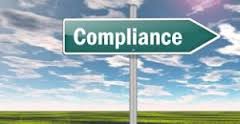Compliance Trends and Predictions for 2017
 The past year was another great success for the compliance profession and related technologies. Compliance continues to grow as the “professionalization” of compliance continues to skyrocket. As my good friend Donna Boehme always reminds me, compliance professionals have the requisite subject matter expertise that many other professionals such as lawyers and auditors lack.
The past year was another great success for the compliance profession and related technologies. Compliance continues to grow as the “professionalization” of compliance continues to skyrocket. As my good friend Donna Boehme always reminds me, compliance professionals have the requisite subject matter expertise that many other professionals such as lawyers and auditors lack.
I often remind compliance professionals of the old saying – “Be careful what you ask for, you might just get it.” Not that I am a pessimist, but compliance professionals continue to be the solution to most corporate governance problems. Chief compliance officers are the overwhelming solution to many problems. Corporate boards and senior executives have placed a lot of responsibilities on their shoulders.
To preserve themselves and protect against corporate blame games, CCOs have to educate company boards and executive leaders that an effective compliance program is not a guarantee against misconduct but is an important mitigating factor against risk.
As we turn to 2017 and a more realistic set of expectations surrounding ethics and compliance programs, here are my predictions for the upcoming year.
Government’s rising expectation for ethics and compliance programs: I know that I can be somewhat repetitive (ask my kids or my wife) but the Justice Department continues to increase its expectations with respect to corporate ethics and compliance programs. Hui Chen, the DOJ Compliance Counsel, has had a big impact in pushing the envelope.
But perhaps the more significant force has been the compliance profession itself. As more people flock to the profession, compliance organizations continue to develop compliance training and information exchanges that inevitably lead to greater innovation and capabilities. In turn, government prosecutors and regulators are learning more about compliance themselves, further developing expectations and potential solutions.
Operationalizing your compliance program: With the increased focus on compliance programs, one specific area of focus has been operationalizing your compliance program. While many companies have adopted detailed policies, procedures and controls, the operationalizing of a compliance program is the true test of a compliance program. Hui Chen coined the phrase in her public statements about compliance programs, and specifically referred to the existence of meaningful working relationships among compliance and critical functions, such as finance, human resources, information technology, legal, auditing and security. A paper program is just that – a program that exists on paper but has not been operationalized.
Auditing and monitoring compliance programs: As more compliance programs mature, companies have to devote attention to auditing and monitoring functions. A compliance program, once operationalized, has to be audited and monitored so that improvements can be identified and implemented.
Companies have to expend increased resources to auditing programs that include third parties and establish proactive strategies to identify potential red flags. Internal auditing of compliance programs and functions is an essential aspect of any auditing and monitoring program.
Focus on corporate cultures: Companies are steadily recognizing that promoting a culture of ethics is profitable and an effective control to mitigating the risk of misconduct. As a result, companies are devoting more resources to developing appropriate corporate values, messaging their values, and reinforcing the importance of corporate values. Senior executives are devoting more attention to communicating the importance of corporate culture and companies are looking for innovative mechanisms to embed corporate culture in mid-level managers and employees.
 Budget growth: Compliance programs require more resources – people and technology. As compliance programs mature, compliance budgets have been relatively stable, except for large regulated companies that have to devote more attention to compliance issues. Even in the manufacturing segment, I would expect compliance budgets to increase in the next few years, especially as companies understand the importance and benefits of promoting a culture of ethics.
Budget growth: Compliance programs require more resources – people and technology. As compliance programs mature, compliance budgets have been relatively stable, except for large regulated companies that have to devote more attention to compliance issues. Even in the manufacturing segment, I would expect compliance budgets to increase in the next few years, especially as companies understand the importance and benefits of promoting a culture of ethics.
Technology solutions: CCOs are quickly learning that they need to technology to leverage their available resources to advance their compliance programs. Whether it is third party due diligence, training or communications systems, CCOs are seeking new technologies that help them to improve their compliance program and devote increased resources to other compliance functions.
Whistleblowers: The SEC has taken an aggressive position with respect to protecting whistleblowers and potential reporting of corporate wrongdoing. There are a lot of legal and institutional forces that will continue this push even if the new administration backs away from aggressive whistleblower protections.
Improved board performance: Corporate boards will devote more attention to compliance issues. It is inevitable and a fact of life. Compliance is a critical function. Board members are not adequately trained on how to supervise and monitor a corporate compliance program. CCOs recognize this fact and will devote more attention to managing and educating corporate board members.
















2 Responses
[…] Read Full Article: Compliance Trends and Predictions for 2017 – Corruption, Crime & Compliance […]
[…] Read Full Article: Compliance Trends and Predictions for 2017 – Corruption, Crime & Compliance […]